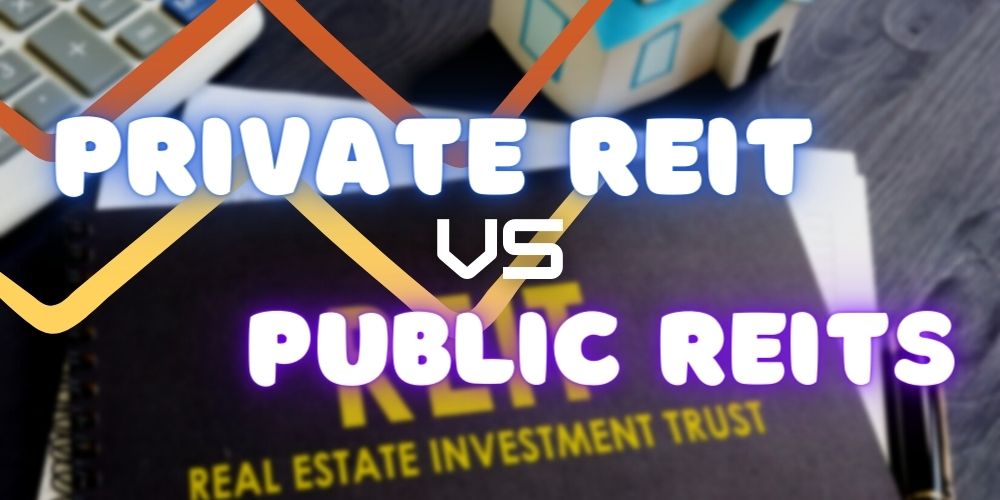Private REITs have much higher dividends than publicly-traded ones but lower liquidity and fewer safeguards.
So, which one should you invest your money in, a private REIT or a public REIT?
We investigated the Private REIT vs Public REITs debate along with the pros and cons, so let’s explore what we found.
What Is a Private REIT?

Brokers only sell a private real estate investment trust (REIT) to qualified institutional buyers (QIBs) or to accredited investors. These financial assets are not subject to the normal SEC regulations, and they do not get listed on major stock exchanges.
They are structured to offer higher dividend yields but require bigger shareholder investments.
Despite higher dividends, their lower liquidity and high entry barriers make them a poor choice for small investors.
On the other hand, they are a good fit and are often bought by institutional investors with the capital and wherewithal to invest in them.
Do Private REITs Pay Dividends?
Yes, private REITs pay dividends, just like publicly traded REITs. In fact, they usually offer higher dividend yields than their counterparts.
While typical public REITs have given 5%-6% dividend yields over the years, private ones often offer 7%-8% or even more.
In fact, that is one of the key benefits of investing in private placement REITs.
Even though they need a higher initial investment, these financial instruments have much stronger returns.
Who Regulates Private REITs?
Private REIT shares are issued under exemptions to the Securities Act.
These exemptions let issuers sell securities directly to qualified institutional buyers (under Rule 144A) and accredited investors (under Regulation D) without going through a stock exchange.
The Securities act is a law that provides protection to normal investors and helps keep markets free and fair. It is enforced by the US Securities and Exchange Commission (SEC).
The exemptions mentioned above are provided for large and sophisticated buyers who do not need the protections of normal investors.
For example, an accredited investor is an individual whose net worth is more than $1 mn or whose total income has been more than $200,000 in the last two years.
For investors who want to buy as a family unit, the total income requirement is $300,000 or more in the last two years, including the spouse’s earnings.
The second exemption is Qualified institutional buyers (QIBs). These are big, sophisticated investors, such as large pension funds, hedge funds, insurance funds, etc.
Typically, QIBs own or manage a portfolio of at least $100 mn worth of securities.
Both the above segments are capable of doing their own due diligence and following a complex investing strategy.
The securities act has allowed creators of financial assets such as REITs to sell their products to them directly rather than through a major stock market.
Are Private REITs Liquid?
Since private REITs are not traded publicly over security exchanges, they are not very liquid.
Typically, investors must wait for a liquidation event before getting their initial investment back in these products.
If an investor wants to withdraw their money before the liquidation event, they have to undergo a redemption program.
These are usually very limited or sometimes even nonexistent, so there is a risk inherent in this asset class.
This starkly contrasts with public REITs, which are openly traded on major stock exchanges.
Therefore, they do not require any special effort from the investor to buy or sell them.
What Is a Public REIT?

Public real estate investment trusts have their shares traded on major stock exchanges. They can be bought or sold just like regular stocks.
They follow the same rules and regulations that apply to other securities and are laid down under the Securities Act. They are overseen by the US Securities and Exchange Commission.
These financial instruments are subject to the same compliance needs as other publicly traded companies, such as regular financial disclosures.
Apart from regular public REITs, there is another class of real estate assets that are not listed on stock exchanges. These are called public non-listed REITs.
These try to combine the features of both public and private REITs. They are illiquid but follow the compliance and regulatory requirements as defined under the Securities Act.
Do Public REITs Pay Dividends?
Yes, public REITS pay dividends. In fact, they are one of the highest dividend-paying securities available.
REITs need to payout at least 90% of their net rental income and any capital gains they have made as dividends to be considered equivalent to securities.
This gives some special benefits to them. For example, they are not considered like a typical corporation for taxation purposes. They are not liable to pay corporate tax on their earnings.
As securities, they become very easy to trade and are highly liquid investments.
Who Regulates Public REITs?
Public REITs are listed on national stock exchanges and are regulated by the US Securities and exchange commission (SEC).
They are considered securities only if they follow the principle that at least 90% of their rental income and capital gains to investors.
Following this rule makes them equivalent to stock and, therefore, tradable on stock exchanges.
Are Public REITs Liquid?
Yes, since public REITs are traded on stock markets, they are highly liquid. Traders can buy and sell them very easily through the usual brokers.
They follow the same rules as other stocks, such as making regular financial disclosures and following regulatory norms as laid down by the SEC.
This makes it easier for investors to judge their potential and make trades on them.
Private REIT vs Public REITs
Private REITs offer high dividends but are less liquid, require a high initial investment, and do not have many safeguards built in for investor protection. Public REITs offer lesser dividends but are better on the other parameters.
Both have pros and cons and are a better fit for different types of investing.
Private REITs can only be offered to large institutional investors, whereas public REITs apply to small and large ones.
Private REITs offer higher dividends than public ones. However, they are not very liquid, so getting out of them is quite difficult.
This makes them very attractive for investors who do not mind putting in a large principal sum for the long term, especially if regular high returns are assured.
Qualified institutional buyers such as hedge funds or large insurance funds can use this strategy to offer good returns to their investors.
Secondly, private REITs are not regulated by the SEC. This makes them slightly unsafe and subject to REIT fraud without much recourse.
They are not required by law to provide regular financial information on their earnings, incomes, and capital gain.
Neither are they subject to as many regulatory conditions as most other securities.
Smaller investors put a big premium on safety, and the inherent risks involved in these funds make them unsuitable for such investors.
Institutional investors, on the other hand, are capable enough to do their own due diligence and checks before putting in their money.
This is why institutional buyers can easily invest in these trusts, but small retail investors cannot.
Large investors use their specialized knowledge, professional fund managers, and financial teams to research and buy these products.
There is usually a huge entry barrier to private REIT investment opportunities. Investors might be required to shell out a minimum investment of as much as $10,000 to $100,000 upfront for them.
This kind of money is obviously not available to small investors, but larger investors might be in a better position to explore them.
Private vs Public REIT Performance
Public REITs typically offer between 5-6% dividend yields. On the other hand, private REITs usually offer 7-8% dividend returns.
Both offer modest capital appreciation and do particularly well during periods of high inflation.
Private REITs have lower compliance costs because they are exempt from the provisions of the securities act. This gives them an edge in offering higher dividend returns.
How Long Do You Have to Hold a REIT?
As per law, a REIT must have at least 100 shareholders for a minimum of 335 days in a 12-month taxable year. If the REIT was started in the middle of the year, then it needs to acquire the 100 shareholders in a proportionate amount of time.
While having 100 shareholders is not a problem for a publicly traded REIT, private ones often find it difficult to meet this criterion.
For REITs formed during the middle or towards the end of the year, finding 100 investors to buy shares without trading on a stock market is daunting.
Moreover, it is impossible to attribute shareholding among firm partners.
For example, 100 partners of a business who all own the REIT as a partnership will not be counted as 100 individual investors. They would only be counted as one.
There are shareholder accommodation services that specialize in securing shareholders for private REITs.
These investors are often brought in as preferred shareholders without voting rights. Such buyers usually receive guaranteed annual dividend coupons, unlike regular shareholders.
How Are REITs Taxed?
Most REIT dividends are taxed as per the income tax slabs under which the investor falls. This can be a maximum of up to 37%, with a 3.8% surcharge for investment income.
Approximately 20% of the combined business income, including eligible REIT dividends, can be deducted from the tax. This means the total maximum tax rate is around 29.6%
In a few cases, these dividends can even qualify for a lower tax rate.
For example, if the taxpayer falls in a lower tax slab, they will pay as per their eligible rate of taxation.
Any income from dividends that occurs due to capital gains by the REIT is taxed at a maximum of 20% and a 3.8% surtax, and not as per the usual income tax.
In some cases, REITs can pay corporate tax and do not fall under the 90% earnings distribution rule.
In this case, the maximum tax rate payable on their dividends would be 20% + 3.8% surtax. Lastly, selling REIT stocks invites 20% capital gains + 3.8% surtax.
Are REITs a Good Investment?
Yes, REITs can be a good investment, both as a portfolio diversification strategy and as a regular passive income in the form of dividends.
They also have the potential for moderate capital appreciation, just like stocks. Real estate assets usually appreciate when the economy is performing well.
REITs can also be a good way to diversify your portfolio and protect yourself against a weaker stock market.
This is especially true in periods when inflation is high. When inflation starts to rise, stock markets typically tend to fall.
However, REITs often do well during such periods because rentals start to rise, and the prices of both private and commercial real estate also go up.
Lastly, this asset class offers excellent passive incomes in the form of regular dividends to investors, which is valuable when the economy is in a slump.
In a way, REITs often behave similarly to value stocks, they grow when the markets are not performing well, but their returns are modest when other stocks are growing rapidly.
Final Thoughts
Private REITs offer significantly better dividend returns than public ones, but at the cost of lower liquidity, lesser regulatory controls, and higher initial investment.
There is a lot to offer, but they are not a great investment vehicle for a small investor. For large institutional investors, they might be a great fit due to their high returns.
Public REITs offer the security, liquidity, and regulatory oversight that smaller investors usually seek. Regular dividends are also offered and moderate appreciation over the long term.
These funds are a good hedge against inflation and an excellent way to diversify a securities-focused portfolio.
Since they are regulated by the Securities and exchange commission, they are required by law to disclose their financials regularly and are easier to analyze.
Because they are traded on regular stock exchanges, to buy and sell is very simple.
Clearly, private REITs are designed and meant for bigger investors, whereas public REITs are more suited to smaller ones.


 Tags:
Tags:










